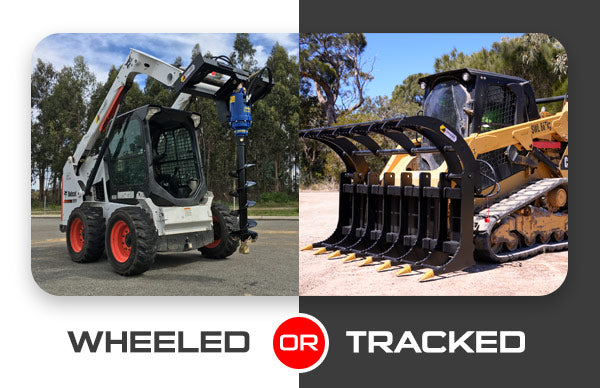
The purchase of heavy equipment for your small business is a large investment. With so many different options available, you may not know which type of equipment is the best fit for you and your needs.
Doing your research beforehand will ensure you end up with exactly what you need for the job. When it comes to choosing between a wheeled skid steer or a tracked loader, it's all about how the machine will be used day in and day out.
There are several different brands available, such as Bobcat, John Deere, CAT, New Holland, Mustang, and Gehl, just to name a few. However, when it comes to the differences between wheeled machines and tracked loaders, the advantages and disadvantages are universal across all brands.
What Is a Wheeled Machine Versus a Tracked Machine?
Before we start comparing the best ways to use each type of loader, let's take a moment to recap the difference between the two. A wheeled loader is just as the name implies. It has four wheels - two on either side, just like a vehicle. A tracked loader, on the other hand, does not have wheels, but instead sits on a pair of tracks. How do you know which style is best suited for your needs? Let's take a look!
What Are the Cost Differences?
When running any type of business such as construction or building, the maintenance costs of your equipment is an extremely important factor. One of the major differences between a wheeled loader and a tracked loader is the cost to replace the wheels and tracks. It is much more cost effective to replace wheels on a skid steer than it is to replace tracks. In fact, replacing tracks can cost up to two times more than replacing a set of wheels. Using tracked loaders in situations best suited for wheeled loaders will wear out the tracks faster, causing you to have to replace them more often.
Situations Best Suited for a Wheeled Skid Steer
A wheeled loader is best suited for situations in which you need dirt compacted. The pressure points of the tires are ideal for packing the dirt underneath. When it comes to demolition and street jobs, a wheeled loader is a better choice than a tracked loader. The reason being is that it is much easier to destroy tracks than tires when it comes to jobs that require demolition. Sharp pieces of concrete and asphalt are much more likely to tear through tracks, which then must be replaced.
Street jobs will not only wear out tracks faster than tires, but can also cause a great amount of damage to the street surface as opposed to a loader with wheels. Should a tire become damaged, it's more than likely you can plug or patch the tire instead of replacing it.
Situations Best Suited for a Tracked Loader
Tracked loaders are great in situations where you do not want the ground compacted. There are many different types of tracked loaders available which float across the ground as opposed to packing it down. They can be used on fragile ground such as lawns or areas that will soon be planted.
Tracked loaders are also great for earth moving jobs on muddy and untamed sites. Tracks provide more surface area than tires and reduce the chances of sinking in mud and getting stuck. Due to the larger surface area, tracked loaders also offer more stability. This makes them a great option for sites that are not improved upon and are being cleared and graded for the first time.
The Best of Both Worlds
For those who really need both a tracked and wheeled loader, but only want to purchase one piece of equipment, there is a solution that combines both. You can take a wheeled skid steer and place rubber tracks over the wheels for the jobs that require a tracked loader and then remove them when you need a wheeled loader.
The Right Tools
No matter which style of loader is right for you, having the proper attachments will make all the difference. Whether you have a skid steer / tracked loader, tractor, telehandler or excavator, Himac has the right attachment for the job. Himac's attachments are manufactured from the best materials and to the highest of standards, with over 80% produced right here in Australia. Every attachment is built to withstand the harshest conditions. Contact us today for more information!


